In a world where we live out a big chunk of our lives online, file hosting services are our lockers on the internet.
From family photo albums to work documents, file hosting services allow you to store just about anything that is digital – safely and easily.
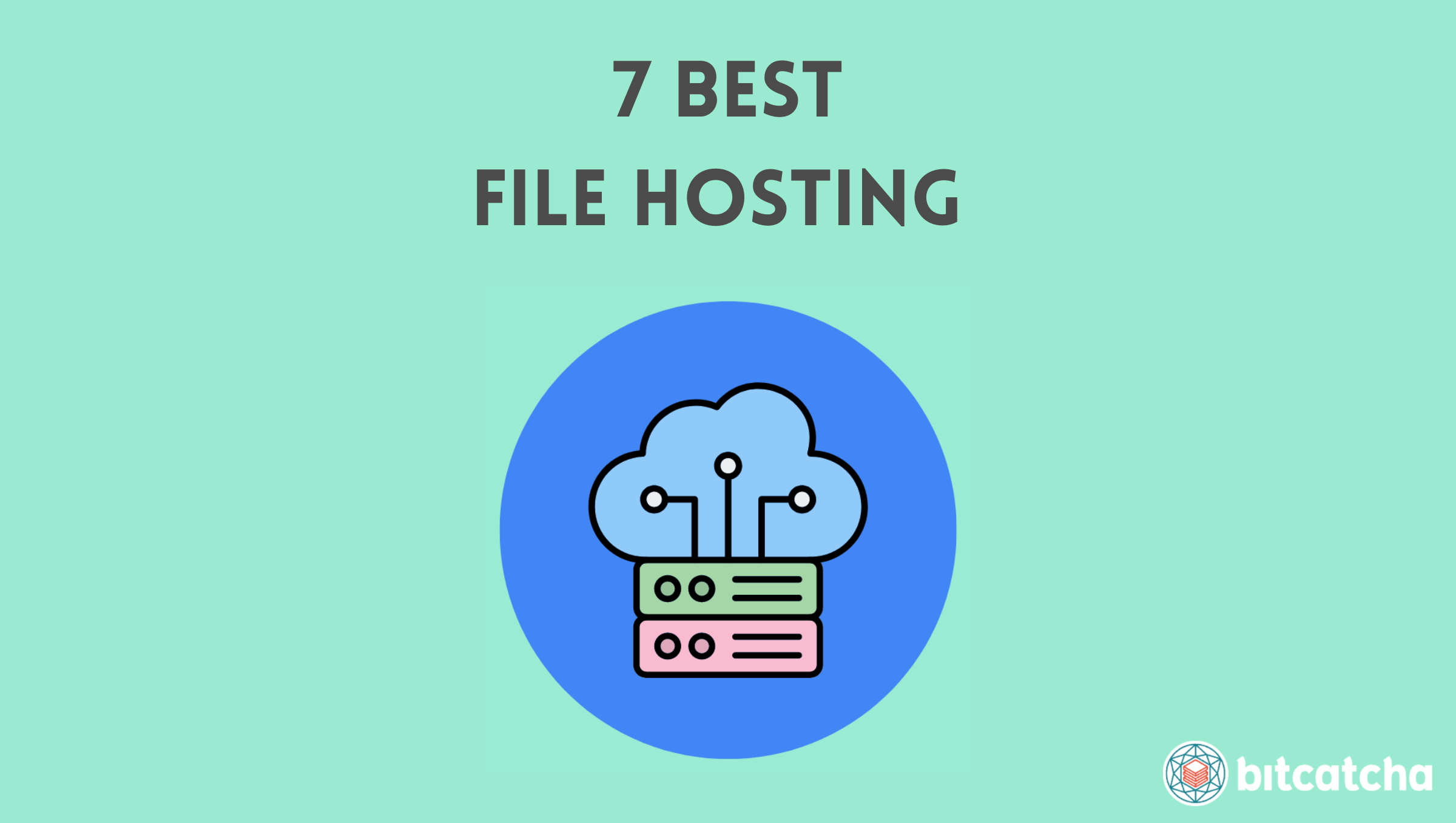
With so many services, how does one make the right pick? We’ve done the research for you and rounded up 7 of the best file hosting services, with both free and paid alternatives to suit any budget.

1. pCloud
https://www.pcloud.com/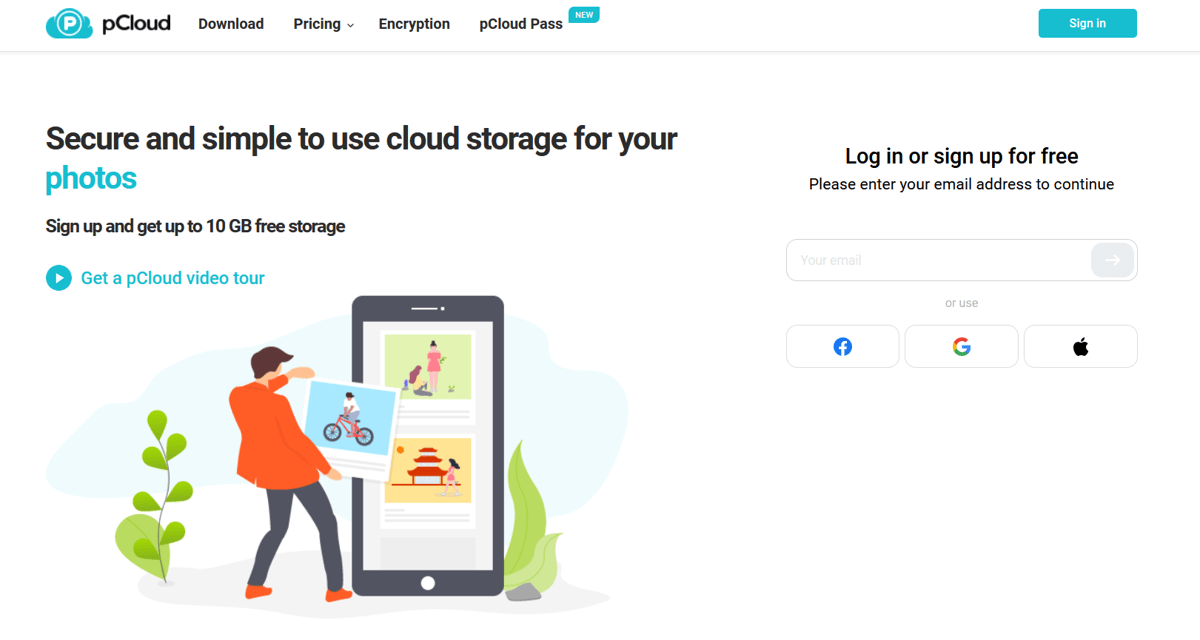
pCloud has carved its own niche as a nifty media file manager for both personal and business use.
For one, it makes file management and sharing easy. It offers solid security and rewind features, which make it a fantastic tool for online backup and for keeping your most important files safe.
But it’s also a breeze to access and play your files. It has inbuilt audio and video players that allow you to play shared media files directly and even curate playlists using the audio player.
Users get up to 10 GB of storage space free, which is ideal for testing thigns out. There are three such plans available – Premium, Premium Plus, and Custom Plan. They start from $49.99 per year and offer up to 10 TB of storage.
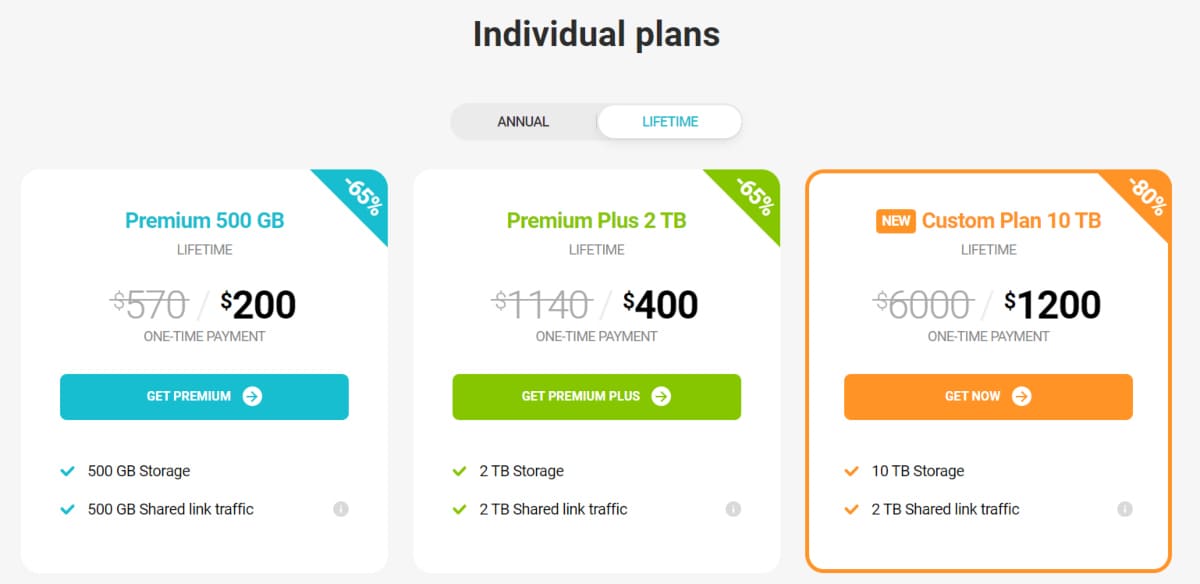
Users will need to choose between an annual or lifetime subscription. Whilst some people may prefer a monthly pay scheme, we think the lifetime subscription is a great money-saver if you’re looking for a long term solution.
Apart from the media player, pCloud users can include custom branding on shared folders and files as well as recover old versions of files that date as far back as one year. Deep dive into the details by reading our full pCloud review.
Pros and cons of pCloud
Pros
- Inbuilt media player
- Same features across all plans, free and paid
- Strong security
Cons
- Subscriptions limited to annual or lifetime
- No document editor available

2. Box
https://www.box.com/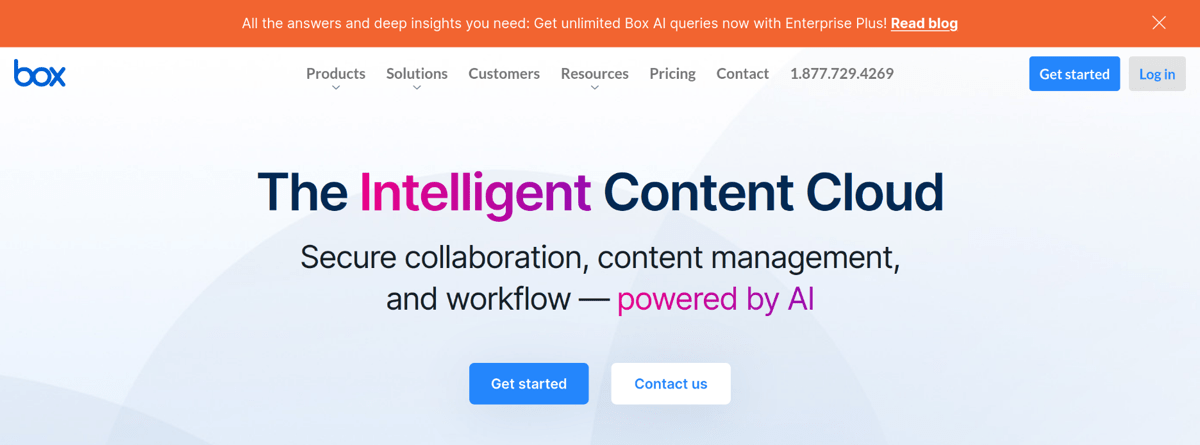
When a file hosting service counts 68% of the Fortune 500 among their customers, you know it’s the real deal.
To start with, Box offers 10 GB of free storage space and an upload limit of 250 MB per file. Paid plans for businesses start from just $5 a month, which upgrades you to 100 GB of storage and 2 GB file upload limit.
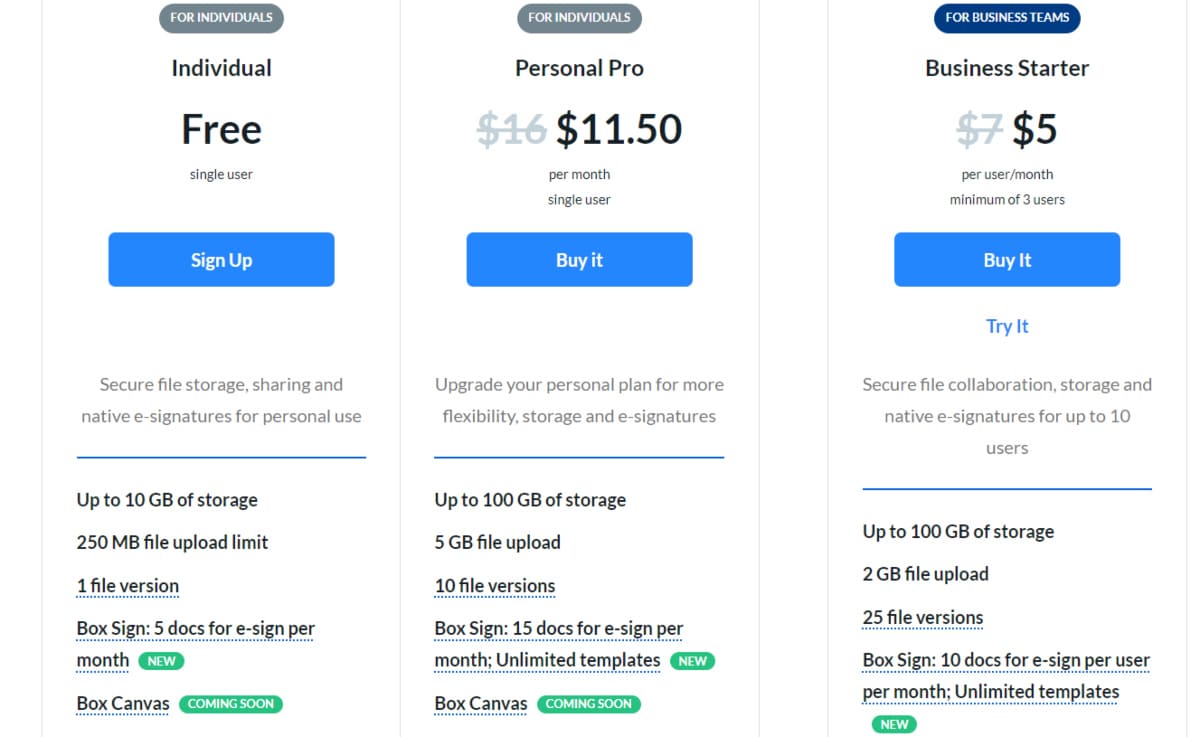
For teams or businesses with multiple employees and large files, they can opt for either Business, Business Plus, Enterprise, and Enterprise Plus, all of which have unlimited storage and maximum users. The main feature that differentiates them is the file upload limit, which goes all the way up to 150 GB for Enterprise Plus.
With its electronic signature feature, you can legally sign documents on the platform. Files are also kept safe with Box Shield, which automatically sets access controls and detects malware. To ease workflow, Box supports over 1,500 integrations with popular tools like Slack, Office 365, and Google.
Pros and cons of Box
Pros
- Affordable prices
- Unlimited storage
- Over 1,500 app integrations
Cons
- Free storage space is relatively low
- Has a small file upload limit
- Direct phone support available for Premier and Platinum Service customers only

3. Dropbox
https://www.dropbox.com/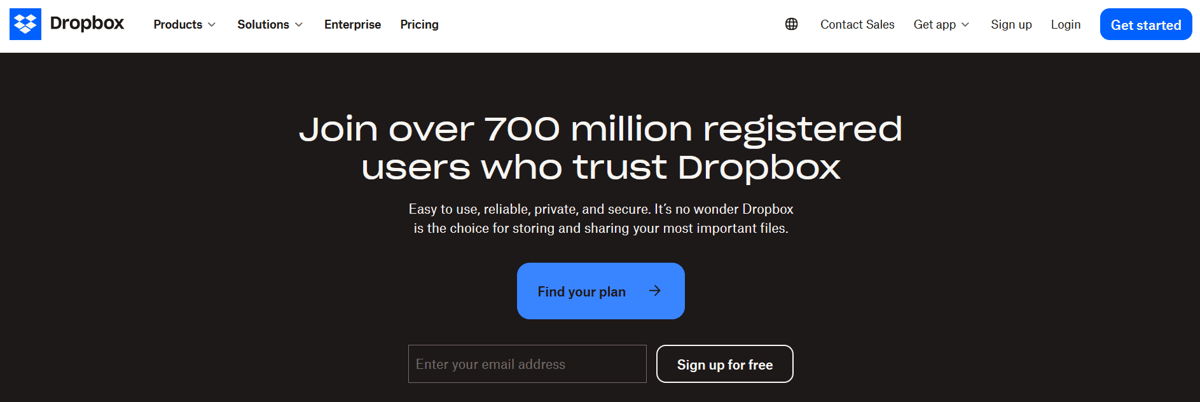
If you’ve ever stored files online, chances are you’ve at least heard of Dropbox.
While its free plan gives users just 2 GB of storage space, individuals can get 2 TB by signing up for the Plus plan which costs $11.99 per month. There are also four other plans to suit various needs and organisation sizes, namely families, solo workers, growing teams, complex teams, and large organisations. For work-based plans, subscribers can even try them out for free for 30 days.

As an established name in the file hosting space, Dropbox has one of the most extensive lists of features. Paying users can create to-do lists for files to keep track of project progress and assign tasks to team members. With the mobile app, they can also scan documents and upload them as PDFs. Security-wise, Dropbox offers two-factor authentication, high-grade encryption, and remote device deletions.
Pros and cons of Dropbox
Pros
- Wide variety of features
- 30-day free trial available
- Sophisticated security features
Cons
- Low free storage space
- Phone support is only available for Standard and Advanced subscribers
- May be a high-risk target for hackers due to its popularity

4. SugarSync
https://sugarsync.com/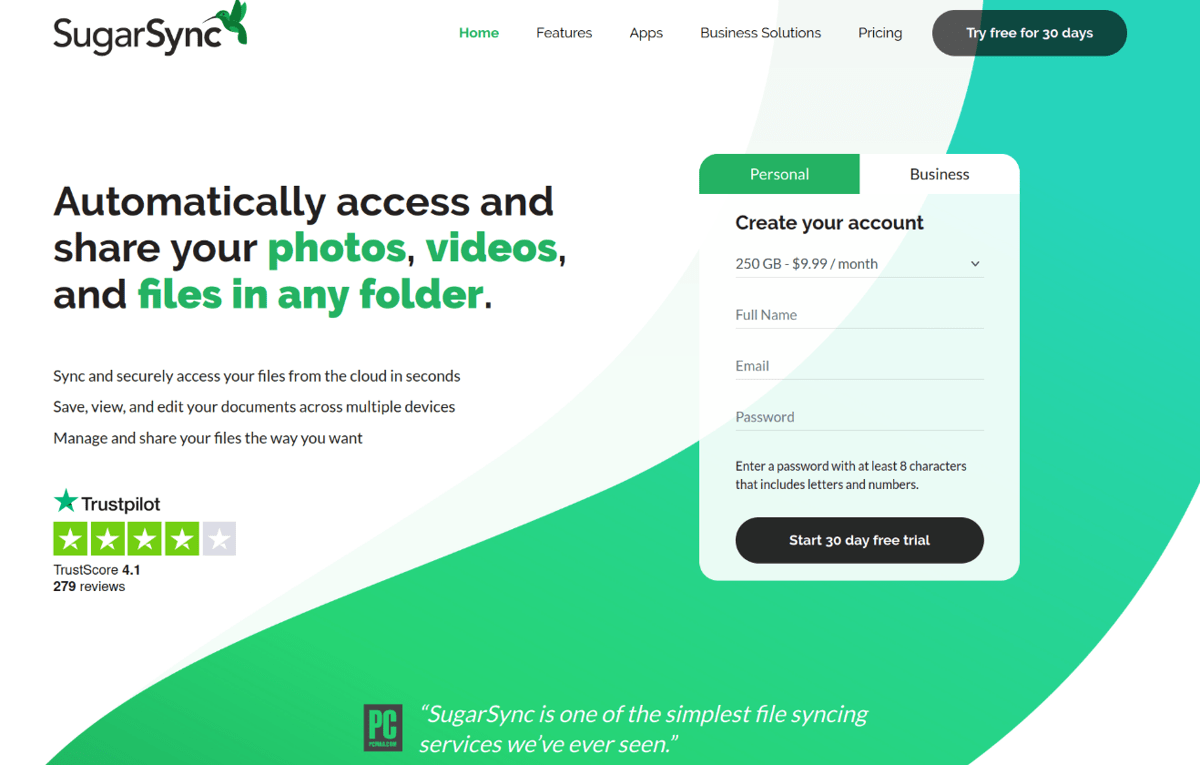
SugarSync is notable for its easy-to-use interface, which is helpful if you’re new to file hosting services.
Its plans are divided into Personal and Business, with Personal plans starting from $7.49 per month and 100 GB of storage space. There is currently only one Business plan available, priced at $55 for 1 TB of storage space. Every plan has a 30-day free trial, so users have ample time to try it out before they commit.
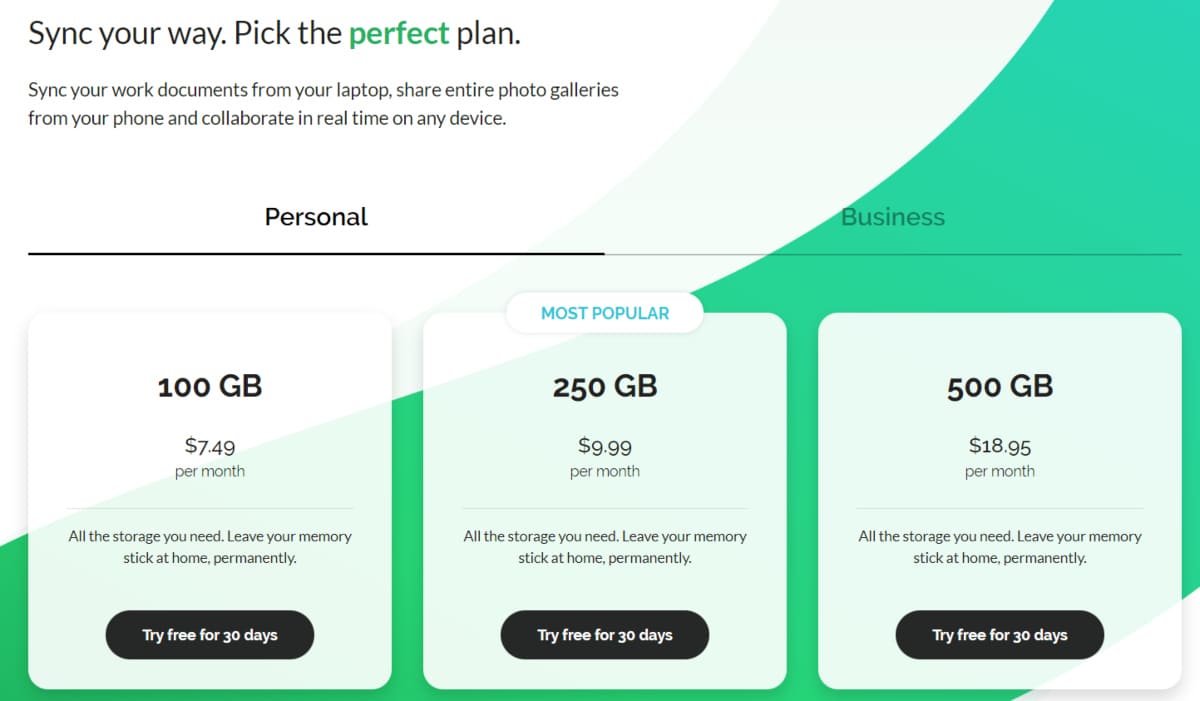
Although its business plan is considerably pricier, SugarSync’s user intuitiveness, security features, and nifty mobile apps justify the price point. Its website touts its security as banking level, so organisations can keep sensitive data and documents protected. Similar to Dropbox, SugarSync also lets users wipe data remotely. Phone support is available for all users as well, regardless of the plan.
Pros and cons of SugarSync
Pros
- Easy to use
- 30-day free trial
- Fast transfer speeds
Cons
- Not cheap
- No advanced file sharing features

5. Google Drive
https://google.com/drive/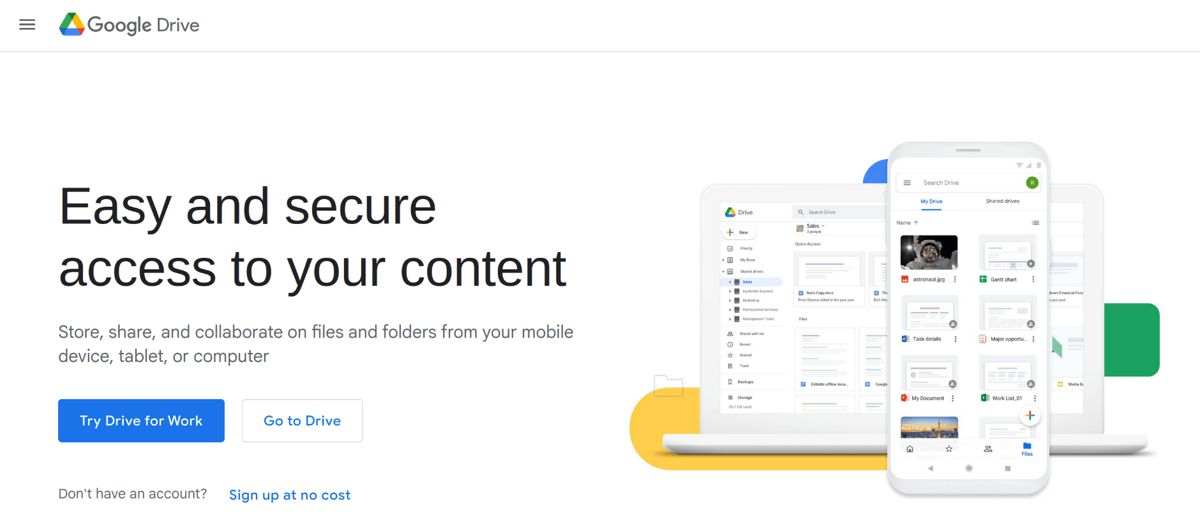
Google Drive is no stranger to anyone who has dabbled in file hosting. Synced to Gmail, one of the most widely used email platforms globally, it is automatically accessible to anyone who signs up for a Google account.
Users get 15 GB of free storage space to start with, and paid business plans start from $6 monthly for 30 GB of storage space. The top-tier plan, Enterprise, does not have a fixed price point, but is customisable according to the enterprise’s needs.
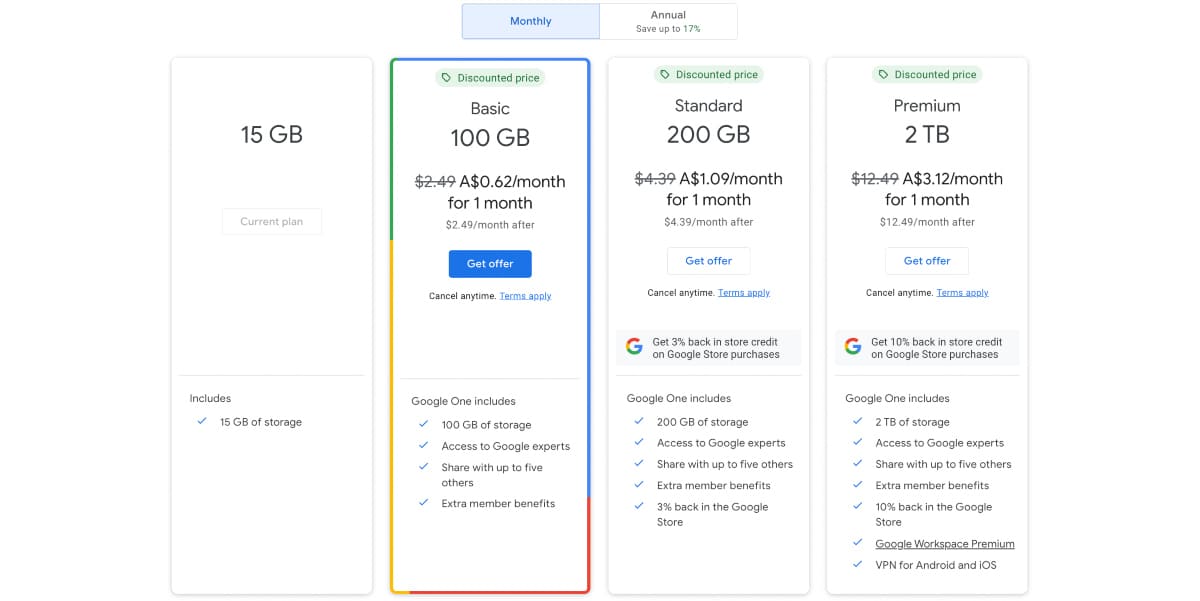
For personal users, it only costs $2 per month to get 100 GB of storage space. The highest plan in this category is priced at $10 per month and gives users 2 TB of storage. Subscribers can also opt to pay annually, which saves them 17% on subscription fees.
As most Google users may know, Google Drive comes equipped with a host of productivity and lifestyle tools, which include Meet, Docs, Calendar, and Sheets. Security has room for improvement, as users aren’t able to seal files or folders with passwords and access is controlled solely via shared links or email invitations.
Pros and cons of Google Drive
Pros
- Integration with Gmail
- Accessibility to wide range of productivity and lifestyle tools
- Affordable entry point
Cons
- Lacking in security features
- No unlimited storage plans

6. Mega
https://mega.io/
If you have highly sensitive or confidential files, Mega is a solid option thanks to its use of end-to-end encryption. It also gives users control of encryption keys, meaning it has zero knowledge of the information being stored on its platform.
Its free plan gets you 20 GB of storage space, with one of the biggest draws being that it comes with the aforementioned end-to-end encryption feature. Beyond that, individual users can choose between four plans, which are Pro Lite, Pro I, Pro II, and Pro III. Prices start from $4.96 monthly, with storage space ranging from 400 GB to 16 TB.
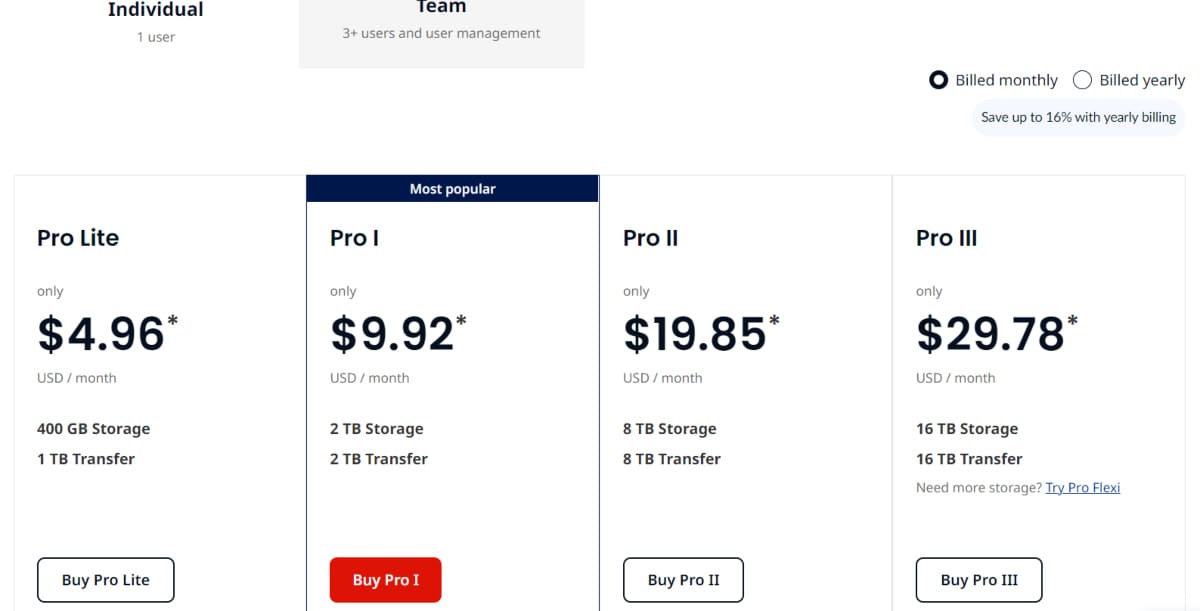
Its business plan is a unique one as it can be customised according to the organisation’s needs, with the price instantly calculated on the website. The basic business plan starts from $14.91 a month and provides a 3 TB storage space as well as file upload limit.
Mega also offers one of the most generous referral programmes around, as users earn 20% of the revenue generated from each purchase by a user they refer.
Pros and cons of Mega
Pros
- End-to-end encryption
- Relatively big free storage space
- Instantly customisable business plan
Cons
- Lack of collaboration features
- No live support

7. Hightail
https://www.hightail.com/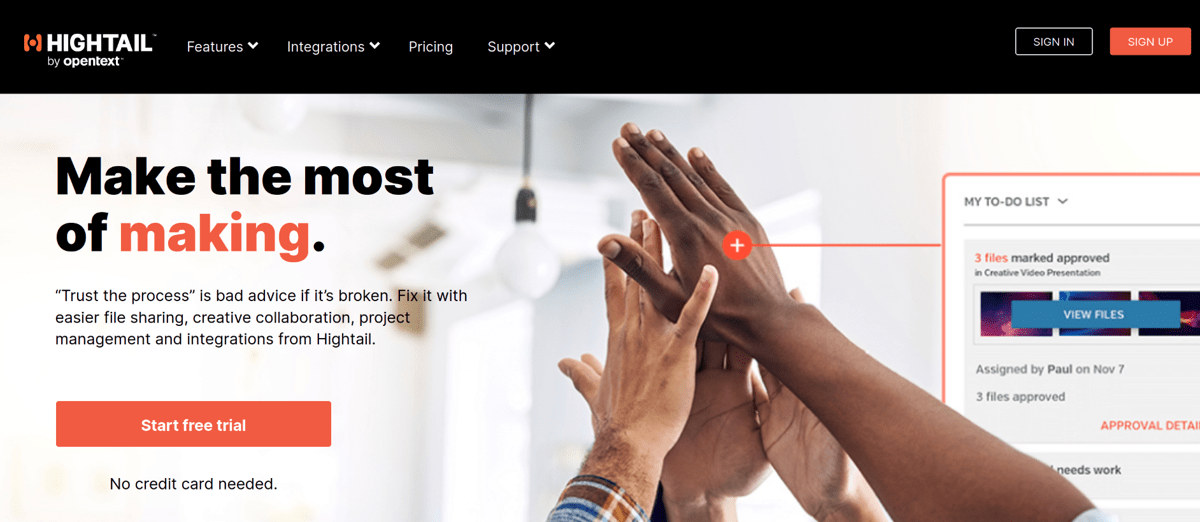
Like Dropbox, Hightail offers a mere 2 GB of free storage space. Fortunately, all its paid plans offer unlimited storage, with file upload limits starting from 25 GB and going up to 500 GB. The first of these plans is Pro, which costs $12 a month. This plan also allows users to share large files with boosted security settings. However, all paid plans are billed annually, so be prepared to fork up a bigger amount upfront.
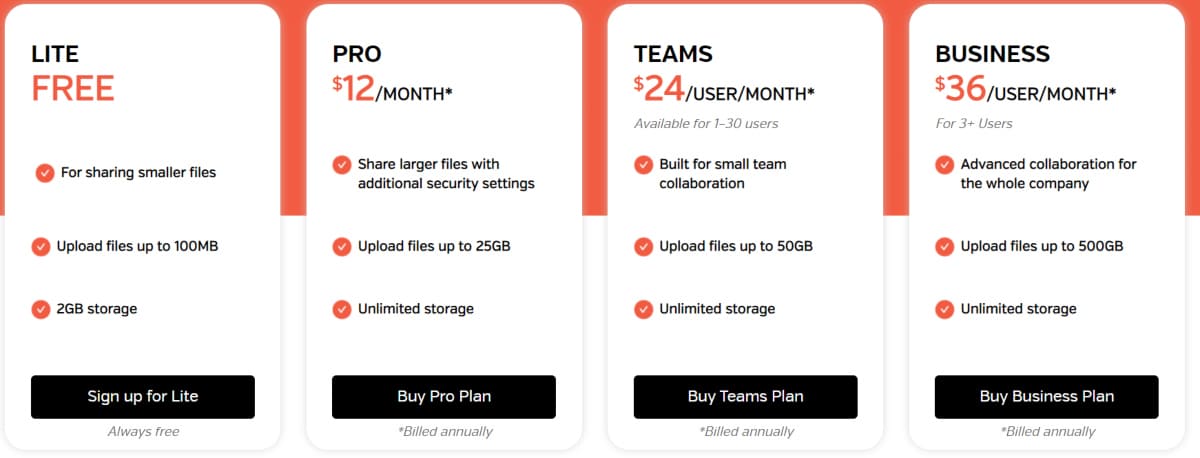
Users receive real-time notifications of when files are received, downloaded, and accessed, adding a layer of security to processes. Depending on the paid plan, users can also compare file versions side by side and have real-time discussions to streamline workflow.
In terms of support, subscribers get live chat and phone support, whereas the full-fledged Business plan affords users a dedicated customer support team.
Pros and cons of Hightail
Pros
- Unlimited storage plans
- Real-time notifications for file sharing processes
- Phone and live chat support available for all paid plans
Cons
- Low free storage space
- Files for free plan expire after seven days
- Only annual subscriptions available
What Is The Difference Between File Hosting And File Sharing?
A file hosting service allows one to upload, share, and access their files anywhere and anytime, so long as there is Wi-Fi. Supported file types range from simple word documents to larger files like videos and photos. Depending on the types of files shared, file hosting services can be used by individuals, families, and organisations of various sizes.
Essentially, file hosting lets you upload and keep your own files on a third-party server. As for file sharing, it is an extension of file hosting whereby you not only keep your files on said server, but have the ability to share access to that file with other users as well.
What Is The Difference Between File Hosting And Website Hosting?
File hosting is technically a type of web hosting service, but the terms are usually used to refer to different things. When people write about website hosting, they’re usually talking about a type of service that’s all about storing your website files and allowing you to publish your site online.
This is where you start to hear about providers such as Hostinger or BlueHost. Common types of web hosting include shared hosting, VPS and cloud hosting.
File hosting is a term that’s often used to refer to services that work as a cyberlocker or cloud storage for your files. This could be for personal use – for example, where you can keep your photos, videos and Word documents safe and easily accessible from anywhere. Or, this could be for business use.
How To Pick The Best File Hosting Service For Your Needs
To ensure you pick the right file hosting service for you or your organisation, these are the factors to consider: security, price, and features.
For organisations, security is the top factor to keep in mind as a data leak or breach could have dire consequences. Aside from that, you can gauge the suitability of a file hosting service by weighing the features you get for the price you pay.
For more coverage on this – check our article on the best cloud storage providers and the considerations you need to keep in mind.



